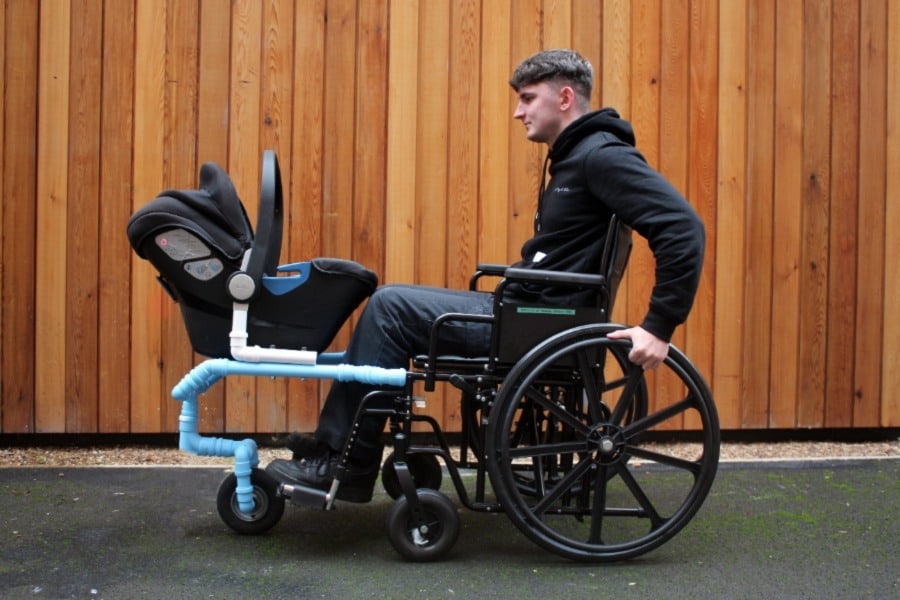Innovative wheelchair buggy that helps parents safely transport children wins design award

A state-of-the-art wheelchair buggy, designed to affix to wheelchairs and help parents safely transport their children, has won Bolt Burdon Kemp’s Design the Change competition.
The competition, in its third year, is intended to raise awareness of the everyday challenges facing people with spinal cord injuries and how innovative designs can make a real difference.
The competition invites UK-based university students to design a product aimed at improving the lives of people with a spinal cord injury. Law firm Bolt Burdon Kemp, which supports people with spinal cord injuries, was looking for a design which was both unique and practical.
Winner Tom Baker, 23, a third-year product design student from Sheffield Hallam University, designed the wheelchair buggy. It comprises a lightweight collapsible frame, offering wheelchair users independent and secure travel with young children utilising existing wheelchair and infant seat fixings for universal use with non-adapted products.
Through Tom’s research he realised that many wheelchair users rig up DIY contraptions so they can push conventional pushchairs. His research revealed there are around 4,000 UK parents with a spinal cord injury and many more parents who are wheelchair users who could benefit from this product.
Victoria Oliver, the head of the spinal injury team at Bolt Burdon Kemp, said: “The standard of entries this year was so high but Tom’s wheelchair buggy really blew the judges away. Through careful research and speaking to a wide range of people, Tom was able to identify the issues facing parents with a SCI and come up with a genuinely innovative and useful product which could benefit many.
“According to research carried out by the Spinal Injuries Association it is estimated that there are more than 50,000 people living with a spinal cord injury in the UK. Every four hours, through accident or illness, someone is paralysed by a spinal cord injury. Adults, children, men, women; everyone is potentially at risk.
“A spinal cord injury is a life changing event that makes even the most mundane of tasks time-consuming and a challenge. Yet despite the increasing number of people living with a spinal cord injury in the UK, not enough is being done to make the world in which we all live accessible.”
Tom wins £3,000, with an additional £2,000 being awarded to Sheffield Hallam University.
Design the Change is supported by Bolt Burdon Kemp’s charity partner Cerebra, which works to improve the lives of children with neurological conditions. Part of the charity’s work is to design bespoke equipment to meet families’ needs at their innovation centre, and, as part of his prize, Tom will have a week’s placement at the centre in Wales next year.
Tom commented: “I’m delighted that my project to enable individuals with a spinal cord injury to travel with an infant safely and independently, has been recognised with this award.
“During my research for this project, I learnt that the work which Cerebra and The Spinal Injuries Association do is crucial in making the world a more accessible place for those who have suffered a spinal cord injury. I’d like to thank Bolt Burdon Kemp for setting the design challenge and endorsing.
“The support I received from the Product Design Department at Sheffield Hallam University was exceptional and I’m pleased that they will share the prize with me.
“I am thrilled that my project has been chosen as the winning design and thank all those involved in supporting me and this inspiring initiative.”
Andrew Marsh from Sheffield Hallam, added: “Tom engaged with a wide range of experts and potential product users to gain valuable insights into the realities of being a parent with an SCI. His buggy proposal is both highly innovative and commercially viable.
“By utilising existing baby seats, he has managed to develop an affordable and user-friendly way for wheelchair users to travel with their children, where it may have otherwise been prohibitively difficult or unsafe.
“BBK’s Design the Change competition really encourages design students to look more closely at accessibility and adaptive design, which they will take into their future careers, contributing to a more inclusive society.”
Thomas’s design was judged by a panel of experts: Dr Ross Head, Product Design Manager for the Cerebra Innovation Centre; Ian Hosking, the club chairman, vice coach, and player for Stoke Mandeville Wheelchair rugby club; Davey Jose, Ambassador to the charity Stoke Mandeville Spinal Research; Lady-Marie Dawson-Malcolm, Support Network Officer for the Spinal Injuries Association; and Claire Martin, Trustee for the Spinal Injuries Association.
Commenting on the winning design, Dr Ross Head, Product Design Manager for the Cerebra Innovation Centre, said: “I loved Tom’s design work, creativity and working prototypes. I think it represented a very well-rounded design student; from great user-guided research through to real-world testing, Tom’s project covered all bases, was well presented and detailed. It was, as usual, a very tough job to decide a winner amongst so many great project ideas and so much hard work that was presented.
“I wish the very best to all of the contestants and thank them very much for their submissions and for stimulating such an enjoyable debate to find a winner! It was a super fun day, and thank you to Victoria and the team for so generously hosting us and making us feel so welcome in London. I look forward to next year already!”
One previous winner of the Bolt Burdon Kemp Design the Change competition was a smart wheel that can be added to most wheelchairs and provides users with assistance on uneven ground, elevation, and on long journeys. Designed by Thomas Salkeld, the wheel can be conveniently controlled from the user’s phone.

